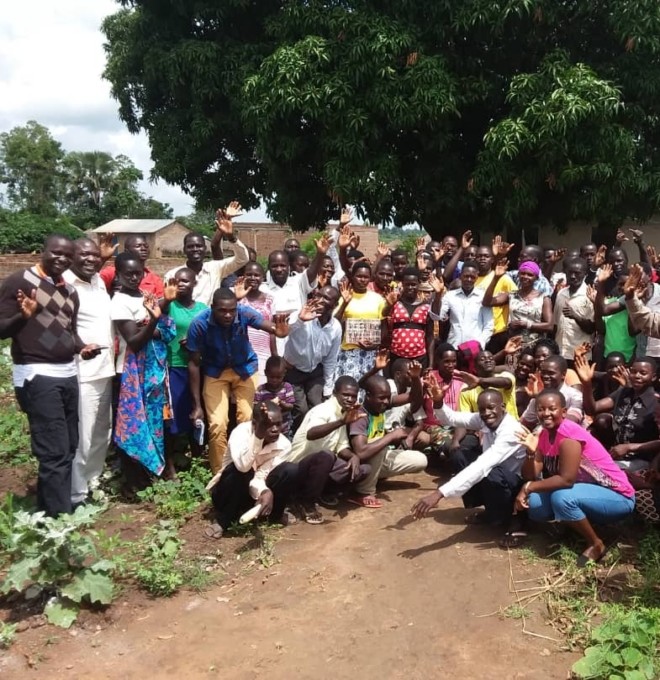
Africa’s True Vibranium
Youth Cooperatives Driving Social Change in Northern Uganda
“I envision Africa as Wakanda,” said David Chukwuma, a Mastercard Foundation Scholar at the launch of Foundation’s new strategy “Young Africa Works.”
Wakanda is a fictitious African nation in the recent blockbuster hit Black Panther. Wakanda is the wealthiest nation on earth thanks to its unique and rare metal called vibranium which they’ve used to achieve incredible advancements in science and medicine.
Africa has the same potential to leverage its unique and most powerful “vibranium”: its young people. Unlike the rest of the world, Africa will keep getting younger. By the end of this century, almost half of the world’s young people will be African.
Beyond this “demographic dividend,” what puts Africa ahead of the rest of the world is the optimism, spirit of solidarity, and energy of its young people. This generation is a powerful force and voice that is eager to work together to rewrite the story of Africa. Working together lifts opportunity for all, particularly those who in the past were left behind.
In Northern Uganda, a young mother who dropped out from primary school, said: “YETA (Youth Empowerment Through Agriculture) pushed me to think out of the box. I got money from my YETA group to buy an ox and plant beans, maize and peas. From the last harvest, I’ve saved enough to buy a bull. I also bought cement to help my husband finish our house. I have four kids, and now, I have managed to put them all in school. Working together with other people in my group has transformed my world, my future is brighter!”.
This is just one example from the more than 27,000 young people working with YETA, a youth livelihoods project implemented by NCBA CLUSA, along with Youth Alive, Reproductive Health Uganda, Making Cents International, and Post Bank Uganda. YETA is one of four consortia in the Youth Forward Initiative, an initiative in partnership with the Mastercard Foundation that combines market-relevant skills training, mentorship, internships, and access to financial services to help young people in Uganda and Ghana, to transition out of poverty and into sustainable livelihoods.
What is unique about YETA is that it enables unemployed young people who have dropped out of school to leverage the cooperative model to launch agriculture enterprises through their youth associations. These organizations are member-owned, democratically-controlled, and serve as platforms for learning, partnering, and earning income. They unleash the power of Ugandan youth to work together to mobilize resources, advance social initiatives, start businesses, gain a voice in their communities, or to take on new leadership positions.
The youth associations – or cooperatives – serve as learning laboratories where young people pick up skills to start their own enterprises. They create spin-off businesses called Community-Based Solution Providers (CBSPs), who are individual youth or small groups who offer on-farm services like planting, weeding, spraying and tillage. About 3,739 youth have become last mile entrepreneurs (CBSPs) who buy and sell fertilizers, seeds, other inputs; offer peri-vet services; engage in post-harvest milling, packing, transport, and warehousing; and open-up market vendors or kiosks. Over 40 percent of these CBSPs are women.
YETA connects youth associations to private sector partners such as the NASECO Seed Company, East African Seed Company, and several Area Cooperative Enterprises to build their enterprise capacity. These partners help youth establish demonstration gardens, which transfer good agronomic practices to other youth as well as other members of the community. These organizations are helping them access improved seeds and larger markets, purchasing their bulked production, supporting them in launching seed multiplication businesses such as soy and beans, and training them in good business practices. Rather than charity, these are business partnerships driven by market incentives which ensure sustainability of the relationships once the program ends.
By working together, youth have better access to formal finance, establishing accounts with Post Bank, Barclays Bank, FINCA and other institutions. Once youth associations are registered with the government, they can access funds from government programs.
Youth associations are growing to form larger production and marketing cooperatives. So far, 117 Youth Associations representing over 1400 youth have come together to seek registration as four marketing cooperatives with the Ugandan Ministry of Trade. These cooperatives will enable them to bulk higher volumes of production, invest in value addition and storage and strengthen business planning and management.
YETA youth average incomes have increased by 26% from 2016 to 2018. While increasing youth income is necessary, it is not sufficient. Youth face societal pressures – both good and bad. Some YETA youth have suffered from the effects of the Lord’s Resistance Army conflict. They are vulnerable to risky behaviour. Access to earned income may only exacerbate negative behaviour. YETA provides training in foundational and life skills to help them develop goals and learn about sexual and reproductive health issues. Under YETA youth gain advice from their peers and mentors as they are making important life decisions.
As we are celebrating the International Day of Cooperatives today, we bring evidence on how cooperative methods have empowered thousands of youth and their communities in Uganda. Cooperatives can be a game changer. They offer new forms of solidarity, social security, democratic participation, and employment to youth in rural areas. The YETA cooperative approach is providing youth an opportunity to drive change by working together to solve problems and gain greater access to skills, resources, finance, and market.
While vibranium transforming Wakanda is fictional, youth groups transforming Uganda is real. It requires unlocking the power of youth to work together, “as one tribe.” As Okello Andrew, a YETA participant, said: “Our association is called Lobo Wire, it means the world has turned around”.


